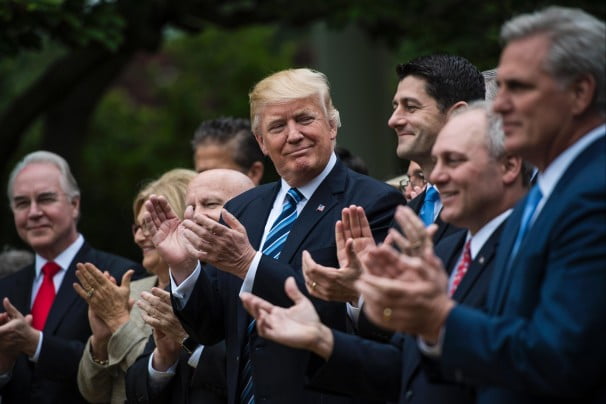
Several Republican leaders have formed a political barricade around the health-care bill that narrowly passed the House last week, defending how the legislation would change insurance coverage for people with preexisting illness or injury.
But while House Speaker Paul D. Ryan (R-Wis.) and Trump administration officials on Sunday rallied around the House legislation after intense criticism from Democrats, who say the bill would strip protections, moderate Senate Republicans were outright dismissive.
“The House bill is not going to come before us,” Sen. Susan Collins (R-Maine) said on ABC’s “This Week,” adding that the Senate would be “starting from scratch.”
The Republican split screen on health care revealed the frothing debate within the party about how to gut aspects of the Affordable Care Act, which became law in 2010 and whose demise has been promised by the Republican Party to its conservative base.
A growing number of Senate Republicans are recasting President Trump’s Rose Garden celebration after the House vote as a mere starting point due to anxiety over how the House bill would affect Medicaid recipients in their states, insurance costs for people with conditions such as diabetes or cancer, or the breadth of health benefits in states that would be able to jettison current federal insurance requirements.
Yet Trump and many of his allies continue to doggedly talk up the House bill, resisting the suggestion that the Senate could discard major items in the proposed legislation, which was crafted with input from the hard-line House Freedom Caucus.
And many of them remain defiant amid the barrage of attacks from Democrats, who have insisted that the House bill would make acquiring coverage more difficult for people with serious ailments and disrupt insurance markets — and see in the Republicans’ efforts a chance to reclaim the House majority next year.
[House Republicans claim a major victory with passage of health-care overhaul]
The seemingly divergent political positioning on display Sunday underscored the fragility of the Republican Party on an issue that has galvanized it for years. Senate Republicans, generally more centrist in their politics, do not feel compelled to herald the House bill. But House Republicans and White House advisers, who are more skittish about fraying the relationships they have cultivated with House conservatives and activists, do not want to shelve or play down the bill that just passed.
Ryan offered a spirited defense of the House bill on ABC’s “This Week” as he was peppered with questions about the possibility of sharp premium increases for people with preexisting conditions.
“We will want to make sure people who have bad health-care status, who have a preexisting condition, get affordable coverage,” Ryan said. “That’s not happening in Obamacare. You got to remember, if you can’t even get a health insurance plan, what good is it? You don’t have health insurance.”
White House Chief of Staff Reince Priebus acknowledged that GOP House members could face criticism but predicted that they would ultimately be “rewarded” by voters.
“Sometimes in life you have to do what’s right, not what’s politically expedient,” Priebus said during an appearance on “Fox News Sunday.”
How the GOP ultimately moves forward this spring and the internecine wrangling over the scope of the final congressional product will have sweeping consequences for the health-care system. With Republicans controlling Congress and the White House, the lingering question for them is not whether to repeal some provisions of the law but whether the Senate or House will hold sway on the details.
“We’re going to go through that process,” White House budget director Mick Mulvaney said on CBS’s “Face the Nation. “Is it ugly? Maybe. Is it slow? Yes, but it’s the right way to do it, and it’s how we’re going to handle this bill.”
[Trump crows about his health-care victory — even though he hasn’t really won yet]
For now, Senate Republicans are signaling that they are in control after weeks of tumult within the House. Collins, along with Sen. Rob Portman (R-Ohio) and Sen. Lindsey O. Graham (R-S.C.), have in recent days spoken out forcefully against parts of the House bill, with Graham saying it “needs to be viewed with suspicion” and Portman asserting that “it does not meet the test of stability” for people who rely on the “safety net” of Medicaid.
Sen. Roy Blunt (R-Mo) said Sunday on NBC’s “Meet the Press” that he and his colleagues would “come up with what the Senate thinks the Senate can do.”
Blunt, who is close to Senate Majority Leader Mitch McConnell (R-Ky.), said the Senate GOP will wait to review a score of the legislation’s cost from the Congressional Budget Office before moving ahead with any vote. The House GOP did not have the final version of their bill scored last week, but it was reviewed in prior forms, with the CBO concluding that 24 million more Americans would lack health insurance by 2026 if that bill becomes law.
“The Senate is going to complete the job of saying just how much more money,” Ryan said on ABC. “This is one stage in a multistage legislative process.” You know how this works. They pass a bill through the House. Then they pass a bill through the Senate and then you go to conference and iron out the differences.”
[Public pans Republicans’ latest approach to replacing Affordable Care Act]
Priebus argued that any concerns about people with preexisting conditions are overblown, stressing that nothing would change for people with coverage through their employer, Medicare and Medicaid. Even people in states where governors seek waivers will be affected only if they don’t have continuous coverage, he said, and there is money in the bill to help them.
“We’ve put billions. . . into high-risk pools to buy down any premiums.” Priebus said, referencing a change to the House bill late last week that would provide $8 billion over five years to help people with preexisting conditions — including cancer, high blood pressure, asthma and even pregnancy sometimes — afford coverage. “If you have a preexisting condition, this president is not going to let you down.”
Priebus said he talked Saturday with six Republicans who are part of the working group on the Senate version of the bill, called them “mature” and said he is confident in the changes they may make.
The talks at the moment mostly involve only Republicans. Sen. Joe Manchin III (D-W.Va.), who has been friendly with Trump, said Sunday that he was distressed that no Democrats have been asked to work on the bill in the Senate. A working group of 13 GOP senators from different parts of the ideological spectrum is meeting twice a week to talk about how to move ahead.
“I’m the most centrist Democrat willing to work and fix things,” Manchin said on “Face the Nation.” He said people in his rural, working-class state would be “completely slammed” by the House bill.
Leading health policy experts have raised questions about GOP claims and how they would work in practice. Among the most significant: How many states would back away from the federal protections for people with medical conditions? How many would cut back on a set of “essential benefits” that current law requires to be included in all health plans sold to individuals or small business? And how many people would lose their coverage because of other changes in the House plan?
There is no one single meaning of “preexisting conditions,” but the term generally refers to acute or chronic ailments that a person has or had in the past and that might return. Such ailments often require more medical care than healthy people tend to use. Before the 2010 Affordable Care Act, the law that Trump and congressional Republicans are eager to dismantle, Americans with such medical challenges often could not get or afford insurance.
[How the House got a health-care bill after Trump and Ryan stepped back]
An estimated 50 million to 129 million Americans have some preexisting health problem, according to an analysis by federal health officials during the Obama administration.
As House Republicans fanned out across the country for a one-week recess, Mulvaney, a former House member from South Carolina, said lawmakers should be “ecstatic” about the chance to talk to their constituents about the legislation.
“Absolutely, without reservation,” Mulvaney said. “That’s what I would do.”
[“Source-washingtonpost”]





